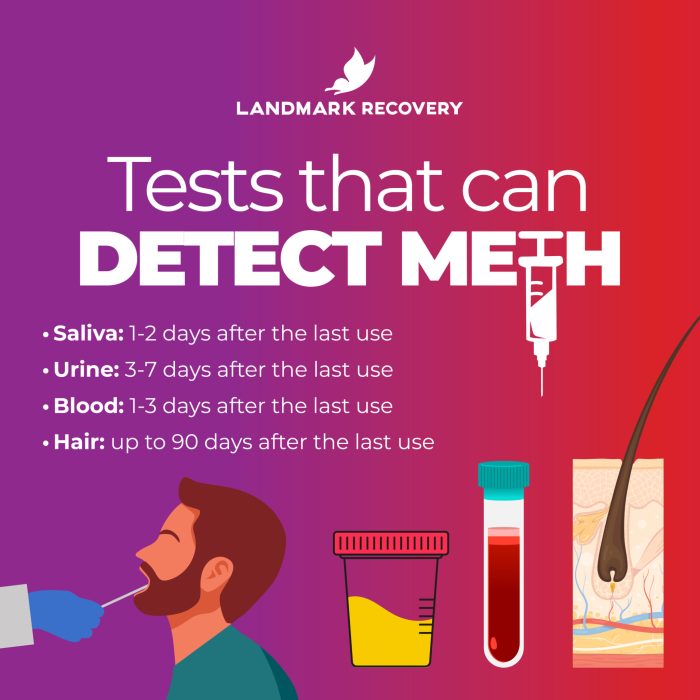How to get meth out of your system fast is a question often asked by those struggling with addiction, but a dangerous one to pursue. This review critically examines the popular, yet often scientifically unfounded, methods for rapid detoxification. We’ll delve into the potential health risks of such attempts, contrasting them with responsible approaches to recovery.
The pursuit of quick fixes for substance use often overlooks the complex interplay of physical and psychological factors involved in addiction. A true understanding of the dangers of rapid detoxification is crucial to making informed choices about recovery.
Methods for Detoxification
Rapid detoxification from methamphetamine is a complex issue, often pursued by individuals seeking a swift resolution. However, it’s crucial to understand that the human body possesses its own intricate detoxification mechanisms. These natural processes are often more effective and safer than artificially induced methods. Approaches claiming to expedite the process should be approached with caution and a critical eye, scrutinizing their scientific backing.
Unscrupulous practitioners frequently exploit the desperation of individuals seeking rapid solutions, leading to potentially harmful consequences.
Common Detoxification Methods
People often attempt various methods to accelerate the elimination of methamphetamine from their system. These methods range from dietary changes and herbal remedies to more aggressive, potentially harmful, approaches. A thorough understanding of these methods is essential for making informed decisions regarding personal health and well-being.
- Dietary Changes: Many believe specific diets can aid in detoxification. Claims often center around increasing fluid intake and consuming certain foods purported to support liver function. While a healthy diet generally supports overall well-being, the scientific evidence supporting specific dietary approaches for methamphetamine detoxification is limited.
- Herbal Remedies: Herbal supplements are another popular avenue. Promoters frequently suggest specific combinations or teas with purported detoxifying properties. These claims, however, are often unsupported by robust scientific evidence. Some herbal remedies may interact negatively with existing medications or health conditions.
- Aggressive Detoxification Protocols: These protocols, often promoted by unscrupulous practitioners, may involve the use of diuretics, laxatives, or other substances to induce rapid elimination of substances. These methods are frequently devoid of scientific basis and may pose severe health risks, including dehydration, electrolyte imbalances, and organ damage.
- Medication-Assisted Approaches: While some medications may play a role in the treatment of methamphetamine use disorders, these medications are typically used under the supervision of medical professionals and are not a substitute for detoxification or treatment.
Scientific Validity of Detoxification Methods
The efficacy of many detoxification methods is often questionable. The human body has natural mechanisms for eliminating substances. Interfering with these natural processes can lead to complications and potentially harm the body. Claims of rapid detoxification, frequently encountered in popular culture or online, should be met with skepticism. Consult with a healthcare professional for evidence-based guidance.
Comparison of Detoxification Approaches, How to get meth out of your system fast
| Method | Description | Scientific Basis | Potential Risks | User Testimonials |
|---|---|---|---|---|
| Dietary Changes | Increased fluid intake, specific food choices | Limited scientific evidence for methamphetamine-specific impact; may support general health | Minimal, but may not address the underlying issues | “Felt better after increasing water intake.” |
| Herbal Remedies | Use of herbal supplements | Little to no scientific evidence for methamphetamine detoxification; may interact with medications | Potential for adverse drug interactions, allergic reactions | “I tried a detox tea, but it didn’t seem to help.” |
| Aggressive Detoxification Protocols | Use of diuretics, laxatives, etc. | No scientific basis; highly risky | Dehydration, electrolyte imbalance, organ damage | (Avoid providing testimonials for potentially dangerous methods) |
| Medication-Assisted Approaches | Prescription medications for addiction treatment | Evidence-based; requires professional supervision | Potential side effects, but generally safe under medical guidance | “Medication helped me stay on track.” |
Health Risks of Rapid Detoxification Attempts

Rapid detoxification attempts, often driven by a desire to eliminate methamphetamine from the body quickly, pose significant risks to physical and mental well-being. These attempts can lead to severe complications, potentially causing lasting harm. Understanding these risks is crucial for anyone considering such methods, as they may be far more damaging than the drug’s continued presence.
Potential Dangers of Hastened Detoxification
The human body possesses natural detoxification mechanisms. Forcing a rapid removal of methamphetamine can overwhelm these systems, leading to a cascade of adverse effects. These attempts often rely on methods that aren’t medically supervised, increasing the risk of serious complications. The body’s response to rapid detoxification can be unpredictable and potentially harmful, causing various physiological and psychological distress.
Physiological Consequences
Rapid detoxification methods can trigger significant physiological responses. These methods may involve extreme measures like forced vomiting or diuretics, leading to dehydration, electrolyte imbalances, and organ strain. Dehydration, in particular, can have severe consequences, affecting the function of the kidneys, heart, and brain. Furthermore, these methods can induce extreme fatigue and exhaustion. Unregulated and excessive use of diuretics can lead to severe complications like heart rhythm disturbances, seizures, and even kidney failure.
Psychological Consequences
The psychological toll of rapid detoxification attempts can be equally severe. The intense physical discomfort and withdrawal symptoms can trigger anxiety, depression, and even psychosis. The stress and pressure to achieve rapid results can contribute to feelings of hopelessness and despair. These negative mental health consequences may persist long after the detoxification process is complete. Individuals undergoing rapid detoxification often experience heightened irritability, insomnia, and intense cravings.
Examples of Complications
Numerous cases illustrate the potential complications associated with rapid detoxification attempts. Individuals who have undergone unsupervised or poorly managed detoxification have reported significant health issues. Some have experienced severe dehydration leading to hospitalizations. Others have developed long-term kidney problems or other organ damage. These examples underscore the importance of seeking professional medical guidance rather than resorting to risky DIY approaches.
Table: Risks of Rapid Detoxification Attempts
| Risk | Description | Symptoms | Potential Long-Term Effects |
|---|---|---|---|
| Dehydration | Rapid fluid loss from the body due to forced methods. | Dry mouth, fatigue, dizziness, headache, decreased urine output, confusion. | Kidney damage, electrolyte imbalances, heart problems, reduced cognitive function. |
| Electrolyte Imbalances | Disruptions in the balance of essential minerals in the body. | Muscle cramps, weakness, irregular heartbeat, confusion, seizures. | Chronic muscle weakness, nerve damage, cardiac arrhythmias, cognitive impairment. |
| Organ Strain | Excessive stress placed on vital organs, particularly the kidneys and heart. | Fatigue, nausea, vomiting, shortness of breath, chest pain, elevated blood pressure. | Chronic kidney disease, heart failure, liver damage, permanent organ dysfunction. |
| Psychological Distress | Intense anxiety, depression, and/or psychosis triggered by withdrawal symptoms. | Irritability, insomnia, hopelessness, panic attacks, hallucinations. | Chronic mental health conditions, difficulty maintaining relationships, increased risk of suicide attempts. |
Responsible Approaches to Substance Use Recovery: How To Get Meth Out Of Your System Fast
Embarking on a path to recovery from substance use requires a comprehensive and compassionate approach that goes beyond simply eliminating the substance. This journey necessitates a profound understanding of the underlying issues and a proactive commitment to building a sustainable, healthy future. This section details responsible and effective strategies for addressing substance use issues, emphasizing the crucial role of professional guidance and support.A holistic approach to recovery recognizes that substance use is often intertwined with other factors like mental health conditions, social circumstances, and past traumas.
A recovery plan must address these interconnected aspects to foster lasting change. This approach prioritizes safety, effectiveness, and the individual’s well-being.
Strategies for Safe and Effective Recovery
Recovery from substance use is a complex process that requires a tailored strategy. A critical aspect of this strategy involves acknowledging the multifaceted nature of the issue and seeking support from qualified professionals.
- Seeking Professional Guidance: Engaging with licensed therapists, counselors, or addiction specialists is paramount. These professionals possess specialized knowledge and experience in helping individuals navigate the challenges of substance use disorders. They can provide personalized treatment plans, address underlying issues, and monitor progress effectively.
- Building a Support System: A strong support system is vital for maintaining motivation and coping with setbacks during recovery. This includes family members, friends, support groups, or mentors who can offer encouragement, understanding, and practical assistance.
- Addressing Co-occurring Conditions: Many individuals with substance use disorders also experience co-occurring mental health conditions like depression, anxiety, or PTSD. Simultaneously addressing these conditions through therapy and medication is crucial for a complete recovery.
Treatment Options and Support Resources
A variety of treatment options are available, each tailored to specific needs and preferences. These options range from individual therapy to group support programs.
| Step | Description | Resources | Expected Outcomes |
|---|---|---|---|
| 1 | Assessment and Diagnosis: A thorough assessment helps determine the severity of the substance use disorder and identify co-occurring conditions. | Addiction treatment centers, mental health clinics, primary care physicians | Accurate diagnosis, personalized treatment plan, identification of underlying issues. |
| 2 | Individual Therapy: One-on-one sessions with a therapist provide a safe space to explore emotions, develop coping mechanisms, and address past trauma. | Licensed therapists, counselors, psychologists | Improved self-awareness, emotional regulation, and coping skills. |
| 3 | Group Therapy: Support groups offer a sense of community and shared experience, allowing individuals to connect with others facing similar challenges. | Alcoholics Anonymous (AA), Narcotics Anonymous (NA), SMART Recovery | Increased social support, reduced isolation, peer learning and encouragement. |
| 4 | Medication-Assisted Treatment (MAT): In some cases, medication can be a valuable component of treatment to reduce cravings, manage withdrawal symptoms, and improve overall well-being. | Psychiatrists, primary care physicians, specialized treatment centers | Reduced cravings, decreased withdrawal symptoms, and improved treatment adherence. |
| 5 | Aftercare and Continuing Support: Ongoing support and aftercare programs help maintain sobriety and prevent relapse. | Support groups, therapy sessions, community programs, sober living environments | Improved long-term recovery, relapse prevention, and maintenance of healthy lifestyle. |
Comprehensive Recovery Plan
Developing a comprehensive recovery plan is essential for sustained success. This plan should be individualized, addressing specific needs and incorporating the individual’s strengths and motivations.
- Setting Realistic Goals: Establishing attainable goals, both short-term and long-term, provides a framework for progress and motivation.
- Building Healthy Coping Mechanisms: Learning and practicing healthy coping strategies to manage stress and triggers is vital for relapse prevention.
- Creating a Supportive Environment: Surrounding oneself with positive influences and minimizing exposure to triggers are crucial components of a successful recovery plan.
Closure

In conclusion, the idea of rapidly eliminating meth from the body through unproven methods is ultimately dangerous and counterproductive. Instead of chasing unrealistic quick fixes, this review underscores the importance of professional guidance, comprehensive treatment plans, and a commitment to sustainable recovery. Safe and effective approaches are available and should be prioritized over potentially harmful shortcuts.
Questions Often Asked
What are the most common methods people try for rapid meth detoxification?
Many people turn to unproven methods like herbal remedies, fasting, or excessive exercise. These approaches lack scientific backing and can be extremely harmful.
What are the immediate and long-term risks of forcing rapid detoxification?
Forcing rapid detoxification can lead to severe health complications, including organ damage, seizures, and mental health crises. The long-term effects can be devastating and include ongoing physical and psychological issues.
What are some reliable resources for substance use recovery?
Seeking professional help from a therapist, counselor, or addiction specialist is essential. Support groups and treatment centers can also offer crucial guidance and resources.
How long does it typically take to eliminate meth from the body?
The time it takes to eliminate meth varies greatly depending on factors like dosage, frequency of use, and individual metabolism. It’s a process that typically requires time and support, not a quick fix.
